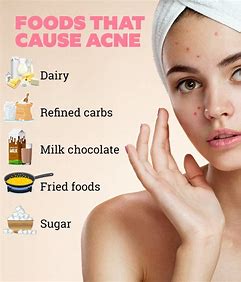Introduction
Acne is a common skin condition that affects millions of people worldwide. While there are various treatments available, one is using a healthy diet to manage and even prevent acne.

Understanding the Connection
Acne develops when hair follicles become clogged with oil and dead skin cells. This leads to the formation of pimples, blackheads, and whiteheads. While genetics, hormones, and skincare routines play a significant role in acne development.
- Consuming foods such as sugary snacks and refined carbohydrates, can cause rapid spikes in blood sugar levels.
- Some studies suggest a link between dairy consumption, especially milk, and acne. Hormones present in milk, may stimulate oil glands and leads to acne breakouts.
- A diet rich in antioxidants, like vitamins A, C, and E, can help reduce inflammation and support skin health. These vitamins are found in fruits, vegetables, and nuts.
TIPS:
- Focus on whole grains, plenty of fruits and vegetables in your diet. These foods provide essential nutrients that promote overall healthy skin.
- Limit your intake of sugary snacks, sodas, and processed foods, as they can lead to inflammation.
- Consider switching to low-fat dairy or dairy alternatives like almond or soy milk.
- Use salmon, walnuts, and flaxseeds, into your diet. These fats have anti-inflammatory properties that can benefit your skin.
- Drinking enough water is essential for maintaining skin hydration and overall health. Aim for at least 8 glasses of water a day.
- it’s important to maintain a balanced approach to your diet. Avoid extreme diets or drastic restrictions, as they can deprive your body of essential nutrients and potentially worsen your skin.
- it’s important to maintain a balanced approach to your diet. Avoid extreme diets or drastic restrictions, as they can deprive your body of essential nutrients and potentially worsen your skin.
- Incorporate a variety of colorful fruits and vegetables into your diet. They are rich in antioxidants that can help combat inflammation and promote skin healing.
- Green tea contains antioxidants that may help reduce inflammation. Drinking green tea or using it as a topical treatment can be beneficial for some people with acne.
- Foods rich in vitamin A, like sweet potatoes, carrots, and spinach, can help support healthy skin.
- Avoid Processed Food.
- Avoid Fried Foods like pakoras, French fries, samosas or kachoris that are everyone’s favorite.
- Turmeric: This spice has anti-inflammatory properties and can be added to various dishes.
- Cucumber: Cucumbers have a high water content, which can hydrate the skin.
- Balance hormones: Foods like flaxseeds and soy contain phytoestrogens that may help regulate hormonal acne.
- Nuts and seeds: These are rich in essential fatty acids that support skin health.
- Avocado: It contains healthy fats and vitamin E, which can nourish the skin.
- Vitamin D: Get sunlight exposure or eat vitamin D-rich foods like fatty fish and fortified dairy products.
- Avoid high-glycemic foods: Sugary and processed foods can spike insulin levels, leading to acne. Opt for low-glycemic foods like whole grains.
- Include ginger in your cooking for its potential skin benefits.
- Consume foods rich in sulfur, such as eggs and broccoli.
- Experiment with spearmint tea for hormonal acne.
- Include zinc-rich foods like pumpkin seeds and lentils.
- Eat tomatoes for their lycopene content, which may help with acne.
- Increase your intake of vitamin A-rich foods like sweet potatoes and carrots.
- Incorporate vitamin E-rich foods like almonds and sunflower seeds.
- Consume foods high in vitamin C, such as citrus fruits and bell peppers.

CONCLUSION:
While diet alone may not be a magic cure for acne, it can play a significant role in managing the condition and preventing breakouts. A healthy diet, rich in whole foods and low in processed sugars, can reduce inflammation, balance hormones, and support overall skin health. However, it’s important to remember that individual should also visit dermatologist.

